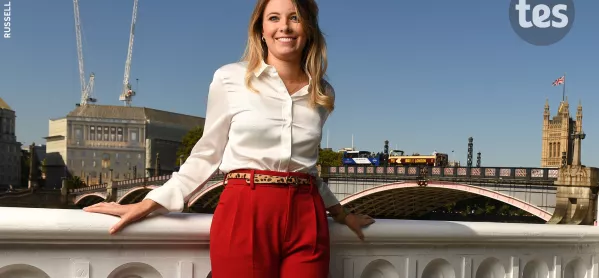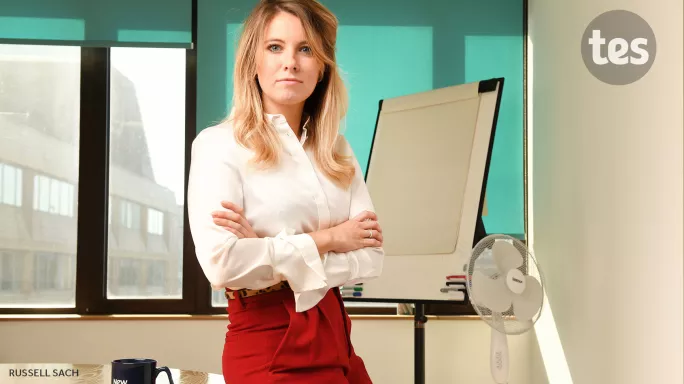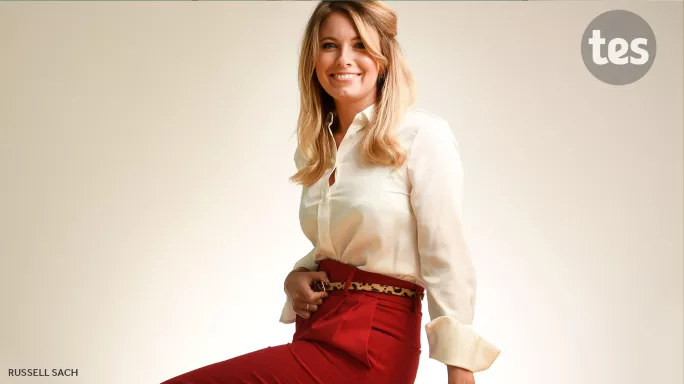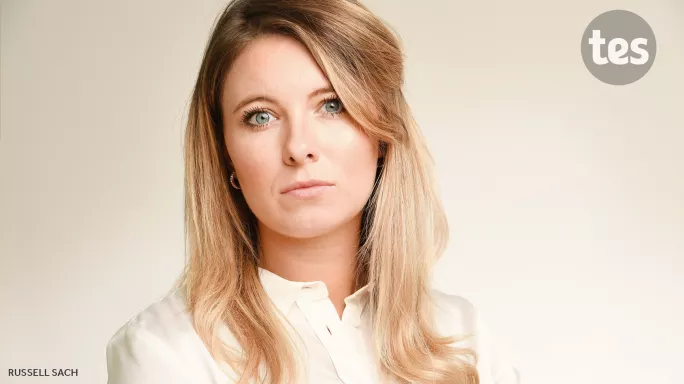- Home
- ‘I want free schools to help other schools’
‘I want free schools to help other schools’

“I am the first director of New Schools Network who hasn’t been a member of the Conservative Party so I think I am of a slightly different mould to what has come before me.”
Unity Howard is the new director of the charity that supports the creation of new free schools.
She has taken up her post at a time when the policy has returned to the front and centre of government thinking.
Quick read: Tryl leaves New Schools Network
Opinion: How will free schools fare under the new Ofsted framework?
Background: Director wants to boost new free school programme
New education secretary Gavin Williamson has made it clear that opening free schools is one of his key policies.
Howard tells Tes that she wants the government to get back to the original vision of free schools as innovative projects that are started by new groups responding to needs in their local area.
But her vision for the future of free schools and the New Schools Network’s role is also somewhat different to the way the movement started.
In the past, champions of the free schools have talked about their role as driving up standards elsewhere through competing with or disrupting the system.
Collaboration not competition
But Howard’s priority is collaboration.
“One of the things the New Schools Network hasn’t done enough of, and it will be one of my priorities as director, is to make more use of the network.
“We have been great at channelling new applicant groups but what we haven’t been so good at is bringing people together.
“Education, at its core, is about collaboration and we don’t want to see free schools competing with the rest of the system. What we want is to bring everyone in the system together, to learn from each other.”
Howard says that it is “mad” that there has not been a national free school conference to allow new schools to share what works.
She said she would like to hold such an event which would be open to all schools.

For many, free schools have been a divisive policy since their introduction. Supporters point to high profile successes such as Michaela while detractors define them by scandals such as the Kings Science Academy in Bradford.
The New Schools Network is also viewed through a political lens.
It was set up as a charity to help deliver the Conservative Party’s free schools policy, and Howard’s predecessors as director have included Rachel Wolf, a Downing Street education adviser to David Cameron; Natalie Evans, now the Tory leader of the House of Lords; Nick Timothy, who became Theresa May’s joint chief of staff; Toby Young; and, most recently, Luke Tryl, who was a former special adviser to Nicky Morgan when she was education secretary.
And it receives a Department for Education grant for its work supporting free school applications.
But Howard stresses that the charity is independent of government and willing to criticise it where there are disagreements. She recently wrote for Tes, accusing the department of being less pioneering and innovative on free schools in recent years.
Howard insists she is more interested in policy than party politics.
“Opening good schools is not a Conservative Party project; it’s not anyone’s project - it’s about kids and I am really willing to work with anyone involved, any party which wants to open good new schools, particularly for those areas that need them where there are high levels of disadvantage and persistent underperformance.
“I think it’s really damaging to think of things as good guys and bad guys.
“You are never going to get good policy that comes out of that process. Currently, the free school programme is run by the Conservative Party.
“In any new colour of government, there is going to be a need to deliver good new schools.
“The Labour Party is really interested in bringing communities into schools so I will work with anyone in future or currently who wanted to deliver on that.”

Howard joined the New Schools Network in 2014 as an intern and has worked her way up the organisation becoming deputy director earlier this year and taking over when her predecessor Luke Tryl left this summer.
Her interest in free schools and education policy can be traced back to various points throughout her life.
When she was just 7 years old, growing up in Oxfordshire, her parents took the decision to move her out of a village primary and into independent education at Headington School because she had not been “thriving” at the state school.
Howard says she is conscious that for many parents that would not be an option, and she says she believes free schools are a way of ensuring money is not the driving factor in ensuring a child can access a good education.
It’s a line that has very much been at the heart of the free school movement since Michael Gove first launched the policy.
But her life has also given her a different insight into education. After graduating, she took up a role working in a vocational training programme at a BMW car plant in Oxford.
“As a young girl who had just finished at university, it was an interesting experience.
“It taught me a lot about how people experience education and how that sits with them for the rest of their lives.
“It was an adult education programme providing qualifications to people who worked on the line for decades, but because they had had such a bad and negative experience of schooling they were reticent to engage with this programme.
“So it was part of my job to stomp around the plant and go locate them and make sure they took part. It was a job that was completely out of my comfort zone but a job that taught me a lot and it is one of the reasons I am so interested in education now.”
At the New Schools Network, much of her work has been involved in supporting groups to open new schools.
“I have worked with more than 50 groups and the majority have opened.
“What is great about that is that as director, I have got to work on some of the nitty-gritty work that we do. And I have got to work with some fantastic projects.
“The first group was a parent-teacher group in Exeter who wanted to open a creative primary school and that school is opening next year and then I have also worked on slightly bigger projects like Saracens which was fantastic because I am a big rugby fan.
“It’s amazing to go to visit a school which was once a twinkle in someone’s eye. But, that being said, we are just here to facilitate the job. It’s about the headteachers, the teachers in the classroom - those people are the real heroes. It is great to work with them and help them to unleash their vision.”

Howard thinks one of the strengths of the free school programme is the variety of proposers it can produce.
Inspired by Saracens rugby club’s involvement, she has a few suggestions.
“For example, we have in the system schools set up by rugby clubs and by football clubs. We have just had this amazing year of cricket. Why don’t we have any cricket free schools?
“There are lots of kids who watched that Ben Stokes test at Headingley saying, ‘Where can I learn about this?’ and it would be fantastic to meet with Ben and any other clubs that would be interested in setting up a free school.”
And she wants more involvement from the arts, too.
“Similarly we need to see more from creative and arts institutions. The V&A [Victoria and Albert] Museum have got a big education programme and I think the natural next step would be for them to open a free school - our doors are always open to Tristram [Hunt] to come and talk about that. It’s about innovation.”
Howard is also looking to help support the growth of community or parent-led free schools in places where pupil progress is lagging behind.
Although there has been wave after wave of free schools, they are increasingly now not big-society community projects started on the ground, but established multi-academy trusts (MATs) setting up new schools.
In the last free school wave, all 22 approvals were multi-academy trusts.
To help the programme get back to its original vision, Howard has two ideas. Firstly, she says, the government should relax the criteria for groups applying.
“The current criteria [are] very focused on demonstrating there is a significant need for places and the need for places is always going to be important, but what this overlooks is some of the areas of the country where there is entrenched educational underperformance.
“What this means is the government is looking at parents and saying, ‘You can’t have a free school because there are places at that school down the road which has been stuck or coasting for decades’. What we want to see is that criteria opening up to make sure we can have new schools in the communities that need them most.”
Growing free school bids
And she wants the New Schools Network to play a role helping to grow free school bids on the ground in such areas.
This month, it is launching an “innovation incubator” pilot programme which will look to identify people who are interested in education in targeted areas and bring them together in the hope of establishing new free school bids.
But as well as trying to get the free school programme back to its origins, Howard also envisages a new role for the New Schools Network as it reaches the end of its first decade - supporting schools that aren’t necessarily new.
There are now around 1,500 single academies that are not part of a multi-academy trust. Many are free schools but the majority are not.
However, Howard believes that free schools and single academy trusts can face many similar challenges, which means the charity feels well placed to support them.
“Increasingly, single academy trusts and small MATs are approaching us for support on their growth strategies, and given our expertise this is something that we are very happy to help with.
“The coming years will see us developing our network even further - not just with the 1,000 free schools that we hope to see open by 2024, but with the 1,500 single academy trusts too.
“A lot of the issues single academies and free schools face are the same and we know it can be lonely in some areas to be a free school and difficult to navigate the system. We want to be able to help with that.”
CV: Unity Howard
- Attended Headington Girls School in Oxfordshire, 1996-2009
- Studied politics at Bristol University, 2009-2012
- PMO training co-ordinator, 2012-2013
- Took a master’s at Kings College, London, 2013-2014
- Joined New Schools Network in 2014
- Appointed the network’s head of applicants programme in 2018
- Appointed the network’s deputy director in April 2019
- Appointed director of New Schools Network in July 2019
Keep reading for just £1 per month
You've reached your limit of free articles this month. Subscribe for £1 per month for three months and get:
- Unlimited access to all Tes magazine content
- Exclusive subscriber-only stories
- Award-winning email newsletters



